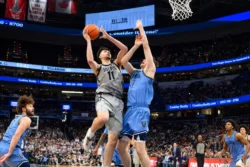With more than a third of the Big East Conference season behind us, it’s time to reflect on preseason expectations. Georgetown is right where they were expected to be at the top of the conference, but just below the Hoyas in the Big East standings sits what many would call a surprise team: the West Virginia Mountaineers.
The coaches’ preseason projection for the Mountaineers suggested a 10th-place conference performance, but the current reality is a little different. West Virginia (15-4, 4-2 BE) is second in the Big East, fourth in scoring offense and first in scoring margin. But is it that big of a surprise?
The Mountaineers only lost two contributors from last year’s NIT Championship team, and they gained a hometown hero and proven winner. Bob Huggins returned to his alma mater with a 590-211 overall record, the sixth-most wins and eighth-best percentage among active coaches in the NCAA.
Huggins is the coaching foil of his predecessor, John Beilein, now head coach at Michigan. It wasn’t really a question of whether or not Huggins would be able to win at West Virginia, but whether the legendary recruiter would be able to win with another coach’s players.
The team has responded with a fascinating hybrid of the two styles. The Mountaineers have a better turnover margin and assist/turnover ratio than anyone in the Big East, and they lead the league in made three-pointers—telltale remnants of the Beilein manifesto. West Virginia will even revert to the 1-3-1 zone defense after a few made baskets throughout the game.
But Huggins has already begun to shape the team into his own time-tested model of success. Take junior forward Joe Alexander. The 6’ 8” Maryland native was the quintessential Beilein recruit—a good passer with the ability to shoot from behind the arc. In one off-season with Huggins, Alexander put on about 15 pounds of muscle and is now one of the most athletic, versatile players in the Big East. The junior is averaging just under 16 points a game, and is the first of many “NBA-ready” bodies that Huggins will create in Morgantown.
Alexander is nursing a groin injury that kept him out of the Mountaineers’ win over South Florida. He did come off the bench to play sparingly Wednesday night against Marshall, but regardless of the forward’s status on Saturday, West Virginia will have plenty of weapons to bear against Georgetown. Senior guard Darris Nichols (11.1 ppg), junior forward Alex Ruoff (16.1 ppg) and sophomore forward Da’Sean Butler (12.9 ppg) are all capable of scoring inside and out.
The Mountaineers will have different defensive looks throughout the game, including the rare triangle and two and the aforementioned 1-3-1 (a zone defense that Georgetown has dominated in the last two years). They will also come out in an aggressive man-to-man. The team’s attention to defense is another effect of the coaching change, and has earned West Virginia the third best scoring defense in the conference.
The Hoyas can take comfort in the fact that West Virginia’s two conference losses came against Louisville and Notre Dame, arguably the two strongest teams that they have played. But both of these losses were on the road, and the Mountaineers are an undefeated 9-0 within the confines of the West Virginia Coliseum.
Tip-off is slated for 7 p.m. on Saturday in Morgantown.





